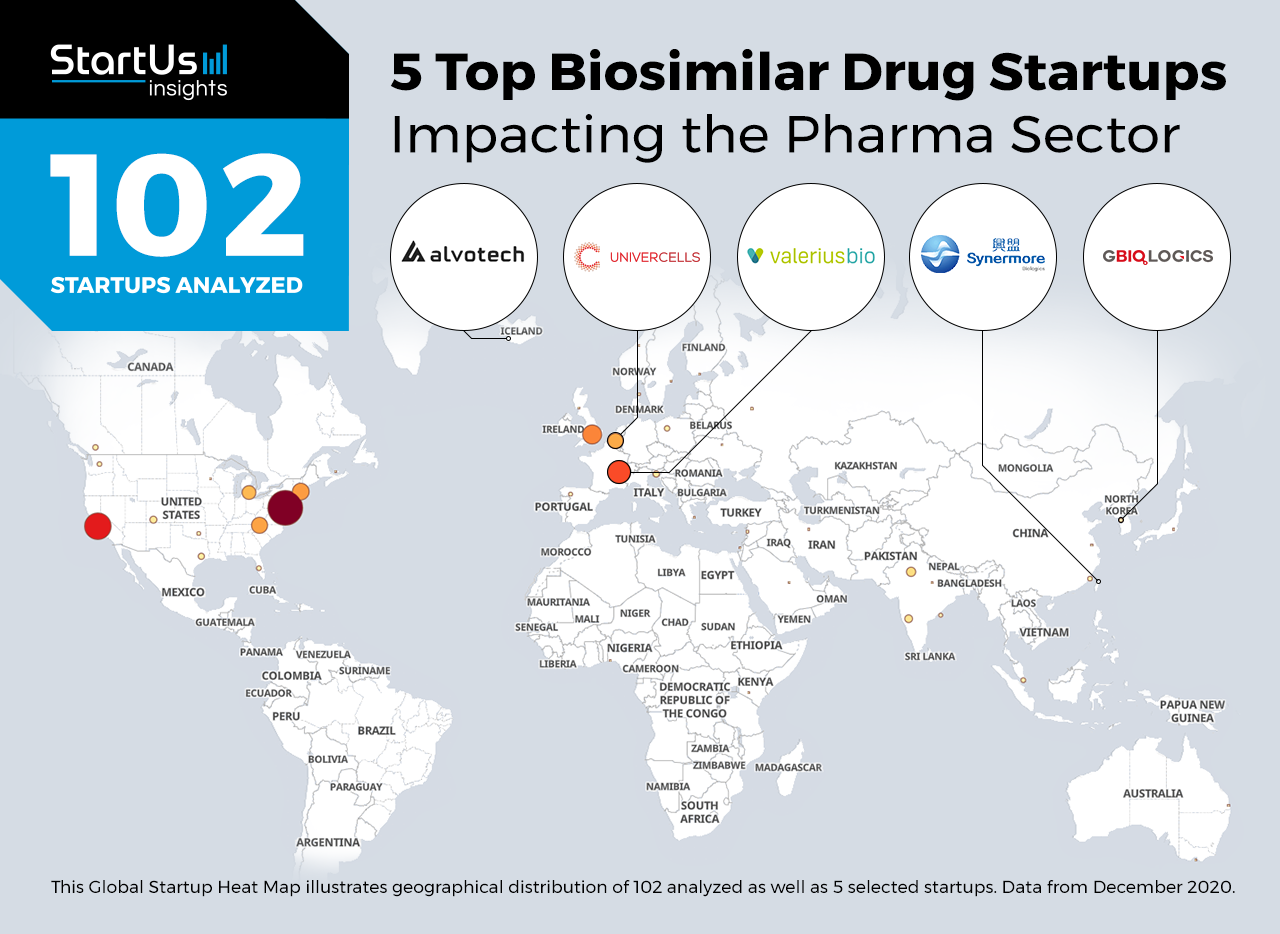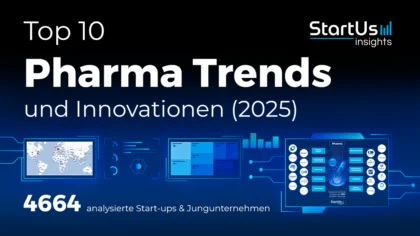Staying ahead of the technology curve means strengthening your competitive advantage. That is why we give you data-driven innovation insights into the pharma industry. This time, you get to discover 5 hand-picked biosimilar drug startups.
Global Startup Heat Map: 5 Top Biosimilar Drug Startups
The 5 biosimilar drug startups you will explore below are chosen based on our data-driven startup scouting approach, taking into account factors such as location, founding year, and relevance of technology, among others. This analysis is based on the Big Data & Artificial Intelligence (AI)-powered StartUs Insights Discovery Platform, covering over 1.3 million startups & scaleups globally.
The Global Startup Heat Map below highlights the 5 biosimilar drug startups & scaleups our Innovation Researchers curated for this report. Moreover, you get insights into regions that observe a high startup activity and the global geographic distribution of the 102 companies we analyzed for this specific topic.
Alvotech – Monoclonal Antibody
Once the patents on drugs expire, pharma startups re-engineer them to develop generics and biosimilars. This makes them affordable for a wider population, helping underserved populations. Moreover, biosimilars are derived versions of original biologics and are evaluated by the same industry standards of safety, quality, and efficacy as the original drugs. Since monoclonal antibodies are one of the most common types of biologics, many pharma startups now develop antibody biosimilars.
Alvotech is an Icelandic scaleup that develops multiple biosimilar monoclonal antibodies and fusion proteins. By manufacturing in a patent-free zone, the startup is able to bring biosimilars to market faster. The startup’s pipeline includes biosimilar monoclonal antibodies for the treatment of immune and inflammatory diseases, ophthalmology, and oncology.
Synermore – Anti-Cancer Biosimilars
Different kinds of cancers afflict millions of patients globally. While biologic drugs show promise in the treatment of cancers, they remain unaffordable for a large number of patients. Pharma startups are working on anti-cancer biosimilars that make cancer treatment more accessible. Biosimilar drugs are interchangeable with biologics and offer the same safety and efficacy in cancer treatment.
Synermore is a Taiwanese startup that offers both novel biologics and biosimilars. The startup’s biosimilars pipeline includes drugs for the treatment of cancers and autoimmune diseases. SYN008 is a biosimilar of omalizumab, sold under the trade name Xolair by Genentech and Novartis. The drug binds free IgE antibodies in the serum, thereby controlling severe allergic responses.
G Biologics – Unmet Clinical Needs
The high costs of biologics mean that certain indications remain unmet clinical needs even though there are treatments available. Biosimilars are less costly and have comparable safety and efficacy. Alongside generics, pharma startups are working on biosimilars to address unmet clinical needs for patients in poor and developing countries.
South Korean startup G Biologics provides a range of bionovels and biosimilars. GB100, the startup’s lead biosimilar candidate, is under investigation for the treatment of wet age-related macular degeneration. The startup is set to begin local phase III clinical trials in collaboration with overseas partners. G Biologics’ pipeline also includes biologics for the treatment of osteoporosis, rheumatoid arthritis, and severe fever with thrombocytopenia syndrome (SFTS).
Univercells – Low-Volume Production
Most drugs, including generics and biosimilars, require large commercial facilities for production. This necessitates huge investments in infrastructure, as well as economies of scale for commercial viability. In spite of the research and development (R&D) costs of bionovels, biosimilars are expensive to bring to market. Pharma startups are exploring new low-volume production regimes to make biosimilars even more affordable for developing markets.
Belgian scaleup Univercells provides affordable vaccines and biotherapeutics to improve access to healthcare. The startup’s pipeline includes a biosimilar of adalimumab, an anti-tumor necrosis factor (TNF) drug used in the treatment of different types of arthritis. The startup’s low-volume production platform meets the needs of cost-efficient biosimilar production for regional demands. Further, a production capacity of 30 kg/year makes the platform suitable for small and medium-size markets.
Valerius Biopharma – Orphan Biosimilars
Pharma startups traditionally overlook orphan diseases for R&D due to them being rare or for being more prevalent in developing countries. However, with incentives for orphan drugs, more pharma startups increasingly see the benefit of developing them. However, many of these drugs remain unaffordable for a large number of patients. Pharma startups developing biosimilars intend to address this economic gap.
Valerius Biopharma is a Swiss startup that provides interchangeable treatments for high-priced biologics. The startup’s biosimilars are in preclinical development and include monoclonal antibodies, enzymes, and fusion proteins. Valerius Biopharma’s pipeline includes orphan biosimilars that make affordable medicine available to orphan disease patients.
Discover more Pharma startups
To keep you up-to-date on the latest technology and emerging solutions, we provide you with actionable innovation intelligence – quickly and exhaustively. You can download our free Pharma Industry Innovation Report and discover new business opportunities or save your time & let us look into your areas of interest. We provide you with an exhaustive overview of new startups, scaleups & emerging technologies that matter to you.









